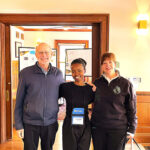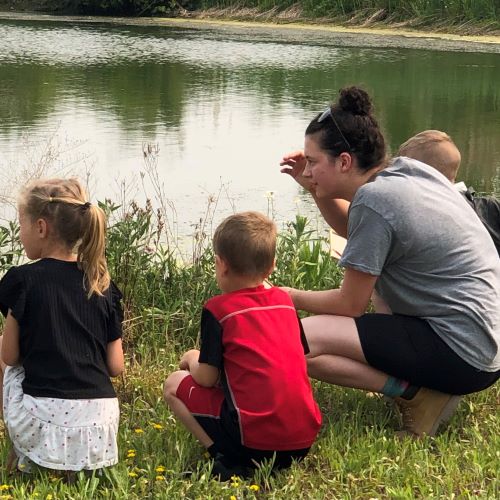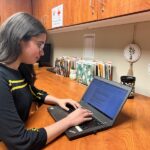
Environmental studies major teaches children about nature in APEX Fellowship

Carolyn Klein ’24, an environmental studies major on the environmental conservation track, planned to conduct research for her Independent Study project at the William J. Robertson Nature Preserve, but found another opportunity that she wasn’t expecting: an APEX fellowship. After reaching out to ask if the preserve wanted to have an intern for the summer, Klein was hired to teach programs to children visiting the preserve and observe the plants and animals on the preserve. While expanding her communication and teaching skills, Klein also learned that she wants to continue her study of birds after graduation and is looking into graduate programs to study behavioral ecology.
“I have improved my communication skills and my ability to present information to an audience with a wide range of background knowledge and keep them all interested and engaged. Both of these skills will help me during graduate school and my future career.”
—Carolyn Klein ’24
How did you learn about the internship opportunity for your APEX Fellowship?
“I found out about the William J. Robertson Nature Preserve through Carlo Moreno, assistant professor of environmental studies, who already had connections to the volunteers at the preserve. I was originally just going to do I.S. research at the preserve, but we decided to reach out and ask them whether they would like to have an intern for the summer. They were really excited about the idea and wanted me to teach children’s programs for them. This position was a great fit for me because I love working with kids and teaching people about nature and all the exciting things you can see around the preserve.”
What were some of the things you did each day?
“My main job was to plan and teach children’s programs at the preserve. Each day, I would spend some time planning or setting up for the next program, if it wasn’t a day that I was actually teaching one. I would also make signup forms and marketing materials for each program. I spent time talking to visitors who stopped by to check out the lab while walking around the preserve, as well as walking around observing behavior and nests of animals at the preserve, watering plants, checking on young trees that were planted last year, taking water quality samples, and organizing the lab or doing other small projects.”
Who was your fellowship mentor and how did they help you to succeed in this position?
“Paul L. Edmiston, Theron L. Peterson and Dorothy R. Peterson Professor of Chemistry, was my mentor for this fellowship. He provided really helpful responses to my reflections and offered me a lot of guidance during my internship.”
What are some skills you’ve learned that you see yourself carrying forward in your career?
“Through this internship, I have improved my communication skills and my ability to present information to an audience with a wide range of background knowledge and keep them all interested and engaged. Both of these skills will help me during graduate school and my future career. It is always important to be able to effectively communicate your own knowledge in a way that is interesting for others.”
How has the internship helped you to see what’s next for you?
“This internship helped me solidify what I wanted to study in graduate school. I have known for a bit that I would like to study something in the field of behavioral ecology, but this internship has helped me realize that I really want to focus on birds. The preserve is a wonderful location for birding, with about 180 species having been spotted here. Being able to spend time every day observing a wide variety of birds and their behavior has been so much fun, and I am excited to hopefully continue doing that in graduate school and beyond.”
Image: Much of Klein’s APEX fellowship involved teaching programs to children. Photo provided by Carolyn Klein.
Posted in Experiential Learning, Showcase Stories 2023 on August 3, 2023.
Related Posts
Related Areas of Study
Environmental Studies
Natural sciences, social sciences, and humanities courses combine for those who want to be part of environmental solutions
Major Minor

